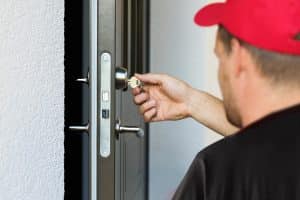The security of your home or business is of utmost importance, and one of the key aspects of security is the locks on your doors. Over time, you might find yourself faced with a decision: Should you rekey your locks or completely change them? Both options have their advantages and disadvantages, and the choice you make should depend on your specific circumstances and needs.
While DIY lock changing offers cost savings and a sense of accomplishment, it’s crucial to assess your own capabilities honestly. If you’re confident in your skills and understanding of locks, a DIY approach could be successful. However, if you’re uncertain about your abilities or the potential risks involved, it’s wiser to invest in professional locksmith services. A professional locksmith not only possesses the necessary expertise to ensure proper installation but can also offer advice on selecting the best locks for your security needs. Remember, the goal is to enhance security, so prioritize effectiveness and safety above all else.
In this comprehensive guide, we will delve into the details of rekeying and changing locks, exploring the pros and cons of each to help you make an informed decision.
Rekeying Your Locks Is It The Best Option?
What is Rekeying?
Rekeying a lock involves altering the lock mechanism so that it can be operated by a new set of keys. The existing lock is not replaced; rather, the internal pins and springs are rearranged to match a new key. This process essentially renders any old keys useless, as they will no longer operate the lock.
Pros of Rekeying
Cost-Effective: Rekeying is generally more cost-effective than completely changing locks. You won’t need to purchase new hardware, which can save you a significant amount of money.
Quick Process: Rekeying is a relatively quick process, usually taking less time than replacing locks entirely. This is especially advantageous if you need to enhance security promptly.
Maintains Existing Hardware: If you have high-quality locks that are still in good condition, rekeying allows you to keep using the same hardware while improving security.
Key Consistency: If you have multiple locks in your home or business and want them all to be operable with the same key, rekeying makes it possible to maintain key consistency across all locks.
Cons of Rekeying
Limited Security Enhancement: While rekeying prevents old keys from working, it doesn’t change the physical lock mechanism. If the existing locks are outdated or compromised, rekeying won’t address these issues.
No Aesthetic Upgrade: If you’re looking to upgrade the appearance of your locks, rekeying won’t provide the visual changes that come with new locks.
Changing Your Locks Is It More Safer?
What is Changing Locks?
Changing locks involves removing the old lock hardware and replacing it with entirely new locks. This process provides a fresh start in terms of security, and it often includes new keys.
Pros of Changing Locks
Enhanced Security: Changing locks provides a higher level of security than rekeying, especially if the old locks are outdated or compromised in any way.
Opportunity for Upgrades: If you’re interested in modern security features, changing locks gives you the chance to upgrade to more advanced options, such as electronic or smart locks.
Aesthetic Update: If you’re looking to improve the overall appearance of your doors, changing locks can offer a new and updated look.
Peace of Mind: Completely changing locks can provide a sense of security and peace of mind, knowing that you’ve taken a comprehensive step to protect your property.
Cons of Changing Locks
Higher Cost: Changing locks is generally more expensive than rekeying, as it involves purchasing new hardware for each door and installation
Time-Consuming: The process of changing locks can be more time-consuming, especially if you have numerous doors to secure.
New Keys Required: Changing locks typically means you’ll need to use entirely new keys, which can be inconvenient if you have many locks and want key consistency.
Making The Decision: Factors To Consider If We Need To Change The Locks Completely
Security Level Needed: If you’ve experienced a security breach or have concerns about the effectiveness of your current locks, changing locks might be the best option for a more secure outcome.
Budget: If you’re on a tight budget, rekeying might be the more reasonable choice since it doesn’t require purchasing new hardware.
Lock Condition: If your locks are in good condition and relatively new, rekeying can be a practical option. However, if they’re old or compromised, changing locks might be necessary.
Aesthetic Preference: If you want to update the appearance of your doors, changing locks offers a fresh look.
Convenience: Rekeying allows you to maintain key consistency, which can be convenient if you have multiple locks.
In Conclusion, What’s The Best Option?
In the end, the decision to rekey your locks or change them entirely depends on a variety of factors, including your security needs, budget, and aesthetic preferences. Rekeying is a cost-effective and efficient way to enhance security when you’re satisfied with the existing lock hardware. On the other hand, changing locks provides a higher level of security and the opportunity for upgrades, although it comes with a higher cost and may involve changing keys.
Evaluate your individual situation carefully and consider seeking advice from security professionals or locksmiths to make an informed decision. Whether you choose rekeying or changing locks, taking steps to secure your property is a crucial investment in your safety and peace of mind.

